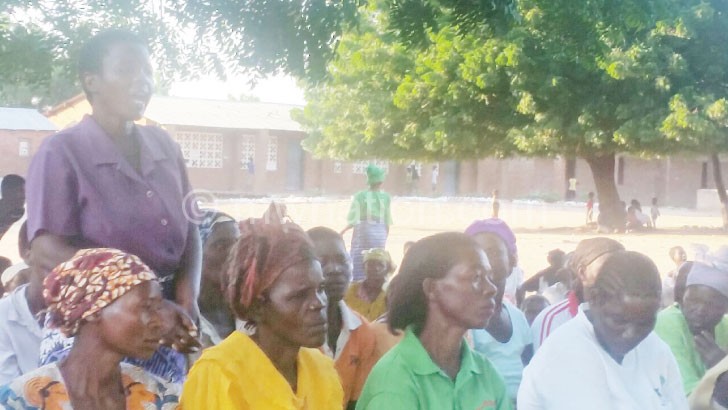Banking hopes on new land law
Ida Bulande, 29, has been growing rice on her two hectares she inherited from her parents about 12 years ago. It is from this piece of land that every year she harvests enough maize to feed her family which comprises herself, her husband and four children.
Bulande, who comes from Sekeni Village, Paramount Chief Lundu in Chikwawa, says rice farming has helped her to educate her children.
“My first born child has finished her studies at teacher’s training college [TTC]. I used earnings from farming to educate her,” she says.
However, Bulande is worried about the future of her farming venture because of threats of land acquisition by Nchalo Association of Cane Growers. The association wants to use the land for sugar cane growing. The land is customary; hence at high risk of being taken over.

Currently, Malawians have no powers over customary land which makes it difficult for them to prevent any investor from getting it.
Furthermore, they have no negotiating powers in terms compensation from investors. The investor decides what to give the people whose land has been taken over.
“The association approached some chiefs in our area telling them that they wanted to use our land for sugar cane farming. In my case, I resisted because I rely on this land for survival. However, this did not yield anything,” says Bulande.
The expansion of sugar cane out-grower schemes in Chikwawa and Nkhotakota districts has become a concern for people in the areas. Here, sugarcane fields have been established on customary land which was being used by the communities.
LandNet, with funding from International Land Coalition, has been sensitising people in Chikwawa, Salima, Mzimba and Nkhotakota on their rights to land.
“Information that LandNet collected from communities in Chikwawa and Nkhotakota reveals that, in some cases, chiefs provided what is termed the chief’s consent for land use changes without consulting or participation of the customary land users.
“In other cases, consultations were held, but, without consent from local communities, deals went ahead, raising suspicion of collusion and corrupt deals between the investors and chiefs,” says LandNet senior programme officer Tawonga Chihana.
In the past 10 years, Malawians in rural areas have witnessed a surge in large-scale land acquisitions for commercial agriculture, something that has threatened their access, control and ownership of customary land.
Chihana says this commercialisation of land in Malawi has aggravated pressures on land in a context of land scarcity and has negatively affected livelihoods of smallholder farmers.
More than 89 percent of Malawians depend on agriculture as their source of livelihood. Thus, access to land is critical for poor Malawians with poverty levels estimated at 50.2 percent.
The current Malawi land laws reflect their origins in the English law which fails to recognise customary land rights as constituting property.
Chihana faults the old land legislation, describing it as weak. She says the legislation has left many poor people vulnerable to land grabbing, where agricultural commercialisation has been pursued in the interests of the elite in the country.
In Malawi, there are three categories of land, namely public, customary and private.
People sitting on customary land are the ones that are victims of land grabbing; hence, LandNet’s calls for Parliament to pass new land bills which will empower people sitting on such land.
“The Land Governance Assessment Framework [LGAF] study revealed a number of land governance challenges in Malawi. Some of these challenges include lack of tenure security for customary land holders, including women and children and continuous fragmentation of land due to population growth.
“The new land law, which is currently in draft form, is addressing this issue by proposing land titling and registration to guarantee tenure security,” says Chihana.
She adds that, while Malawi is in desperate need for agricultural investment, the prevailing legal framework does not adequately protect the smallholders’ land rights or safeguard the interests of customary land users in the face of growing pressures towards agricultural commercialisation.
Says Chihana: “The processes involved in land use changes have often been coercive, non-transparent and non-participatory. Land transfers negotiations with local communities have often been unbalanced, with superficial consultation and an absence of compensation for loss of land and related resources.”
LandNet national coordinator Emmanuel Mlaka corroborates that investment’s effects on the future livelihoods of customary land users need to be addressed, just as has the “unclear structure of acceptable compensation” due to affected land users.
While referring to the Agriculture Sector Wide Approach (ASWAp) under the Ministry of Agriculture, Irrigation and Water Development which focuses on sustainable agricultural land management, Mlaka says it is important that as Malawi commercialises its agriculture, the local communities should not suffer.
Chairperson of Natural Resources and Climate Change committee of Parliament, Werani Chilenga, says the land bills may be discussed during the current sitting of Parliament.
“There is hope that the 10 land-related bills will be discussed during this parliament sitting. Chances are high that it will be done shortly,” says Chilenga. n





